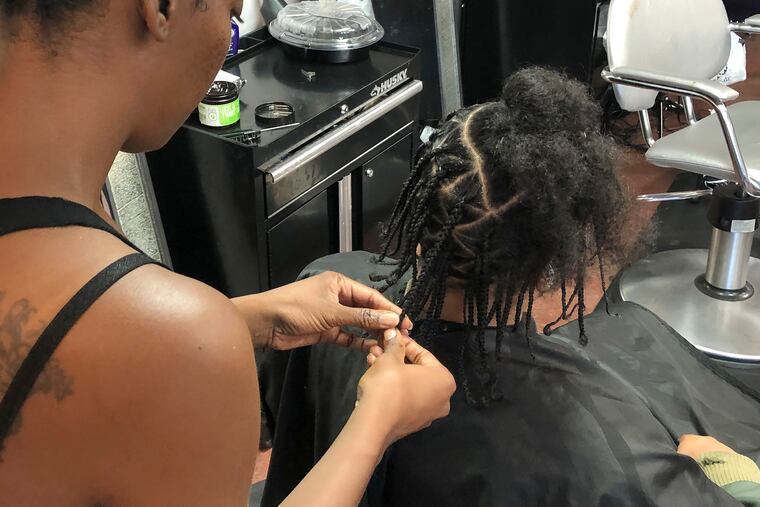A two-decade fight to exempt natural hair braiders from Pa. oversight inches forward
Passed in the House in March, the bill, which exempts braiding from regulatory oversight, is now in the Senate where State Rep. Donna Bullock is optimistic the pro-business measure will find support.

As the popularity for natural hair braiding boomed, so too did entrepreneurial braiders’ frustration over Pennsylvania regulatory oversight.
Since 2003, hair braiders have been opposed to the state Cosmetology Board’s view that braiders are cosmetologists and, as such, need hours of formal training and a license to practice in order to protect public safety. The braiders’ position was they didn’t use dye or other chemical products that could harm customers so they should be able to practice free from state involvement.
Their effort inched closer to reality when State Rep. Donna Bullock’s (D., Phila.) bill to exempt the hair braiding industry from all regulatory oversight passed the House of Representatives unanimously in March and went to the Senate.
While the bill could die in the Consumer Protection and Professional Licensure Committee of the Senate, Bullock said she is feeling optimistic that it will pass the Republican-controlled chamber because it is essentially a pro-business measure.
“When Donna Bullock’s bill passed the House, we informed the hair braiders and it brought quite an amount of joy,” said Eric Edi, the chief operating officer of the Coalition of African and Caribbean Communities in Philadelphia (AFRICOM).
Edi estimates at least 300 hair braiders operate in Philadelphia, although he acknowledges AFRICOM’s count doesn’t include part-time and home-based braiders.
Deregulating braiding
Braiding is a skill that provides many — mostly female — entrepreneurs, with a livelihood. Most, however, operate without a license — risking fines and having their salons shuttered, said Nadia Hewka, a senior staff attorney with Community Legal Services.
If Bullock’s bill is signed into law, Hewka said, ”It will be a huge weight off their shoulders.”
» READ MORE: N.J. bill would require cosmetology schools to teach textured hair and promote inclusivity, sponsors say
Originally, the state’s Cosmetology Law required 1,250 hours of instruction, at a cost of thousands of dollars, to learn material which had little to do with natural hair braiding. In 2006, the state responded to the braiders’ initial outcry by creating an alternative permitting requirement that only required 300 hours of hair braiding instruction.
“It was difficult to comply with the [new] law,” said Hewka, explaining that few cosmetology programs in the state offered the 300-hour braiding program, and instruction was only offered in English when many braiders are West African immigrants with limited English skills.
“Diversity creates opportunities for bills.”
Diversity moves bills
State Sen. Anthony Hardy Williams introduced a bill in 2018 to do away with the 300-hour cosmetology school requirement.
“This costly regulation does not benefit small business owners, hair braiders, or their customers,” Williams said at the time.
But the bill failed to become a law.
About 20 years ago, Bullock said, when braiders first joined together under the leadership of AFRICOM, the state legislature did not have an understanding of natural hair or what skills were needed for braiding. Today, several representatives — both male and female — have natural hair styles, including Speaker of the House Joanna E. McClinton.
“We’re a more diverse legislature. Diversity creates opportunities for bills,” said Bullock, who sponsored the legislation along with State Rep. Regina Young, who represents parts of Delaware and Philadelphia Counties.
There are reasons for braiders to be optimistic. Currently, 33 states have deregulated hair braiding.
» READ MORE: In the long fight to deregulate natural hair braiding, one Olney salon owner scores a win
And last year, a Commonwealth Court panel declared that the state’s licensing requirements violated Philadelphia hair braider Maimouna Thiam’s constitutional right to make a living with requirements that were unreasonable.
Edi said at the time that the ruling, which only addressed Thiam’s business, signaled to other hair braiders that “hope is on the way. This is a case of jurisprudence that will inform other potential cases.”
Hair braiding is not just a modern hairstyle choice but an ancient art form with a long and rich cultural history, Bullock said.
“Natural hair braiding has been commonplace in the African American community for centuries,” Bullock said. “The techniques have been passed from generation to generation and are learned from early childhood and do not require formal training to do.”